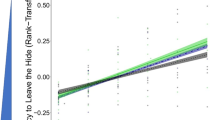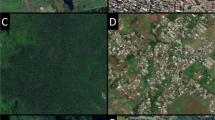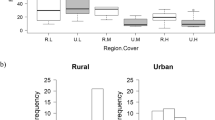Abstract
Urban environments are novel landscapes that markedly alter animal behavior. Divergence in behavior in response to urbanization may provide advantages in navigation, exploiting resources, and surviving under a novel suite of selective pressures. Relatively few studies, however, have identified population-level behavioral changes in response to urbanization that are not confounded by rearing environment and prior experience (e.g., an urban upbringing). To address this, we used the Australian water dragon (Intellagama lesueurii) to test whether populations under varying levels of urbanization (urban, semi-natural, and natural populations) differ in their innate behavioral traits; acquired either heritably or due to population-specific maternal effects. Eggs were collected from wild mothers and hatched in the lab. Hatchlings were then reared in the lab under standardized conditions (a common-garden experiment). We then assayed individual behavioral traits (boldness, exploration, and neophilia) five times across their first year of development. We compared behavioral traits, as well as their expression (repeatability), between urban, semi-natural, and natural populations. Neophilia and explorative behavior was similar among all populations. However, dragons from semi-natural populations were significantly bolder than those from natural populations. Urban dragons were also bolder than dragons from natural populations, although this trend was not significant because of high variance in boldness. Dragons from semi-natural and urban populations had similar boldness scores, suggesting a potentially biologically relevant difference in boldness between them and natural populations. We also saw some differences in the consistency of the expression of behavior. Boldness in individuals from urban environments was also the only repeatable trait. Overall, our study suggests that boldness is an innate, urban-derived divergent behavioral trait that likely contributes to the success of these lizards in anthropogenically altered environments.
Significance statement
Lizards from human-modified areas are innately bolder than ones from natural habitats. To determine this, we raised lizards from eggs collected from urban, semi-natural, and natural populations in a standardized environment, removing the effects of prior experience and developmental environment, and examined their behavioral traits over time. The difference we found in boldness was related to their origin population, rather than being shaped through experience, suggesting this trait may be heritable and is being selected for in anthropogenic landscapes. Our study addresses an important gap in studies of urban behavioral ecology by examining behavioral differences among replicated, differently urbanized, sites after experimentally accounting for both rearing environment and prior experience.

Similar content being viewed by others
Data availability
The datasets generated during and/or analyzed during the current study are not publicly available due to logistical constraints, but are available from the corresponding author on reasonable request.
References
Alberti M, Marzluff J, Hunt VM (2017) Urban driven phenotypic changes: empirical observations and theoretical implications for eco-evolutionary feedback. Philos Trans R Soc B 372:20160029. https://doi.org/10.1098/rstb.2016.0029
Atwell JW, Cardoso GC, Whittaker DJ, Campbell-Nelson S, Robertson KW, Ketterson ED (2012) Boldness behavior and stress physiology in a novel urban environment suggest rapid correlated evolutionary adaptation. Behav Ecol 23:960–969. https://doi.org/10.1093/beheco/ars059
Barnett CA (2015) Urban hymns how urban environments affect bird populations and avian singing behavior. In: Mahala G (ed) Seabirds and songbirds: habitat preferences, conservation and migratory behaviour. Nova Science Publisher Inc., Hauppauge, pp 115–134
Bates D, Mächler M, Bolker B, Walker S (2015) Fitting linear mixed-effects models using lme4. J Stat Softw 67:1–48. https://doi.org/10.18637/jss.v067.i01
Baxter-Gilbert J (2014) Heterospecific coprophagy in an eastern water dragon, Intellagama lesueurii lesueurii, (Gray 1831). Herpetofauna 44:34–37
Baxter-Gilbert JH (2018) Behavioural and biological responses of Australian water dragons (Intellagama lesueurii) to urbanisation. PhD thesis, School of Biological Sciences, Macquarie University, Sydney, AU
Baxter-Gilbert J, Riley JL, Whiting MJ (2018) Runners and fighters: clutch effects and body size drive innate antipredator behaviour in hatchling lizards. Behav Ecol Sociobiol 72:97. https://doi.org/10.1007/s00265-018-2505-7
Bell AM (2012) Animal behaviour: personality in the wild. Nature 491:341–342. https://doi.org/10.1038/491341a
Bell AM, Hankison SJ, Laskowski KL (2009) The repeatability of behaviour: a meta-analysis. Anim Behav 77:771–783. https://doi.org/10.1016/j.anbehav.2008.12.022
Bertin A, Richard-Yris MA, Houdelier C, Richard S, Lumineau S, Kotrschal K, Möstl E (2009) Divergent selection for inherent fearfulness leads to divergent yolk steroid levels in quail. Behaviour 146:757–770. https://doi.org/10.1163/156853909X446190
Biro PA, Stamps JA (2015) Using repeatability to study physiological and behavioural traits: ignore time-related change at your peril. Anim Behav 105:223–230. https://doi.org/10.1016/j.anbehav.2015.04.008
Blumstein DT (2014) Attention, habituation, and antipredator behaviour: implications for urban birds. In: Gil D, Brumm H (eds) Avian urban ecology: Behavioural and physiological adaptations. Oxford University Press, Oxford, pp 41–53
Bókony V, Kulcsár A, Tóth Z, Liker A (2012) Personality traits and behavioral syndromes in differently urbanized populations of house sparrows (Passer domesticus). PLoS One 7:e36639. https://doi.org/10.1371/journal.pone.0036639
Brown JH (1978) The theory of insular biogeography and the distribution of boreal birds and mammals. Great Basin Nat Mem 2:209–227 https://www.jstor.org/stable/23376568
Canty A, Ripley B (2017) boot: Bootstrap R (S-Plus) functions R package version 1:3–19, https://cran.r-project.org/web/packages/boot/index.html
Carazo P, Noble DW, Chandrasoma D, Whiting MJ (2014) Sex and boldness explain individual differences in spatial learning in a lizard. Proc R Soc B 281:20133275. https://doi.org/10.1098/rspb.2013.3275
Cogger HG (2014) Reptiles and amphibians of Australia, 7th edn. Reed Books, Chatswood
Damas-Moreira I, Riley JL, Harris DJ, Whiting MJ (2019) Can behaviour explain invasion success? A comparison between sympatric invasive and native lizards. Anim Behav 151:195–202. https://doi.org/10.1016/j.anbehav.2019.03.008
Davison AC, Hinkley DV (1997) Bootstrap methods and their applications. Cambridge University Press, Cambridge
Diamond JM (1986) Natural selection: rapid evolution of urban birds. Nature 324:107–108. https://doi.org/10.1038/324107a0
Dingemanse NJ, Réale D (2005) Natural selection and animal personality. Behaviour 142:1159–1184. https://doi.org/10.1163/156853905774539445
Ditchkoff SS, Saalfeld ST, Gibson CJ (2006) Animal behaviour in urban ecosystems: modifications due to human-induced stress. Urban Ecosyst 9:5–12. https://doi.org/10.1007/s11252-006-3262-3
Dohm MR (2002) Repeatability estimates do not always set an upper limit to heritability. Funct Ecol 16:273–280. https://doi.org/10.1046/j.1365-2435.2002.00621.x
Ellis EC, Ramankutty N (2008) Putting people in the map: anthropogenic biomes of the world. Front Ecol Environ 6:439–447. https://doi.org/10.1890/070062
Evans J, Boudreau K, Hyman J (2010) Behavioural syndromes in urban and rural populations of song sparrows. Ethology 116:588–595. https://doi.org/10.1111/j.1439-0310.2010.01771.x
Favati A, Zidar J, Thorpe H, Jensen P, Løvlie H (2016) The ontogeny of personality traits in the red junglefowl, Gallus gallus. Behav Ecol 27:484–493. https://doi.org/10.1093/beheco/arv177
Fox J (2003) Effect displays in R for generalised linear models. J Stat Softw 8:1–27. https://doi.org/10.18637/jss.v008.i15
Fox J, Hong J (2009) Effect displays in R for multinomial and proportional-odds logit models: extensions to the effects package. J Stat Softw 32:1–24. https://doi.org/10.18637/jss.v032.i01
French SS, Fokidis HB, Moore MC (2008) Variation in stress and innate immunity in the tree lizard (Urosaurus ornatus) across an urban–rural gradient. J Comp Physiol B 178:997–1005. https://doi.org/10.1007/s00360-008-0290-8
Garroway CJ, Sheldon BC (2013) Urban behavioural adaptation. Mol Ecol 22:3430–3432. https://doi.org/10.1111/mec.12351
Geggie JF, Fenton MB (1985) A comparison of foraging by Eptesicus fuscus (Chiroptera: Vespertilionidae) in urban and rural environments. Can J Zool 63:263–266. https://doi.org/10.1139/z85-040
Gerstner K, Moreno-Mateos D, Gurevitch J, Beckmann M, Kambach S, Jones HP, Seppelt R (2017) Will your paper be used in a meta-analysis? Make the reach of your research broader and longer lasting. Methods Ecol Evol 8:777–784. https://doi.org/10.1111/2041-210X.12758
Greggor AL, Berger-Tal O, Blumstein DT, Angeloni L, Bessa-Gomes C, Blackwell BF, St Clair CC, Crooks K, de Silva S, Fernández-Juricic E, Goldenberg SZ, Mesnick SL, Owen M, Price CJ, Saltz D, Schell CJ, Suarez AV, Swaisgood RR, Winchell CS, Sutherland WJ (2016) Research priorities from animal behaviour for maximising conservation progress. Trends Ecol Evol 31:953–964. https://doi.org/10.1016/j.tree.2016.09.001
Griffin AS, Guez D, Federspiel I, Diquelou M, Lermite F (2016) Invading new environments: a mechanistic framework linking motor diversity and cognition to establishment success. In: Weis JS, Sol D (eds) Biological invasions and animal behaviour. Cambridge University Press, Cambridge, pp 26–46
Griffiths K (2006) Frogs and reptiles of the Sydney region. Reed New Holland, Sydney
Groothuis TG, Müller W, von Engelhardt N, Carere C, Eising C (2005) Maternal hormones as a tool to adjust offspring phenotype in avian species. Neurosci Biobehav Rev 29:329–352. https://doi.org/10.1016/j.neubiorev.2004.12.002
Harlow PS (2001) Ecology of sex-determining mechanisms in Australian agamid lizards. PhD thesis, School of Biological Sciences, Macquarie University, Sydney, AU
Harlow PS, Harlow MF (1997) Captive reproduction and longevity in the eastern water dragon (Physignathus lesueurii). Herpetofauna. 27:14–19
Holtmann B, Santos ESA, Lara CE, Nakagawa S (2017) Personality-matching habitat choice, rather than behavioural plasticity, is a likely driver of a phenotype-environment covariance. Proc R Soc B 284:20170943. https://doi.org/10.1098/rspb.2017.0943
Hosking C (2010) Husbandry guidelines for Australian water dragon, Physignathus lesueurii (Reptilia: Agamidae). Australian Museum, Sydney http://www.nswfmpa.org/Husbandry%20Manuals/Published%20Manuals/Reptilia/Water%20Dragon%20(Hosking).pdf
Johnson MTJ, Munshi-South J (2017) Evolution of life in urban environments. Science 358:eaam8327. https://doi.org/10.1126/science.aam8327
Kar F, Whiting MJ, Noble DWA (2016) Influence of prior contest experience and level of escalation on contest outcome. Behav Ecol Sociobiol 70:1679–1687. https://doi.org/10.1007/s00265-016-2173-4
Kralj-Fišer S, Schneider JM (2012) Individual behavioural consistency and plasticity in an urban spider. Anim Behav 84:197–204. https://doi.org/10.1016/j.anbehav.2012.04.032
Kralj-Fišer S, Hebets EA, Kuntner M (2017) Different patterns of behavioural variation across and within species of spiders with differing degrees of urbanisation. Behav Ecol Sociobiol 71:125. https://doi.org/10.1007/s00265-017-2353-x
Lampe U, Reinhold K, Schmoll T (2014) How grasshoppers respond to road noise: developmental plasticity and population differentiation in acoustic signalling. Funct Ecol 28:660–668. https://doi.org/10.1111/1365-2435.12215
Lapiedra O, Chejanovski Z, Kolbe JJ (2017) Urbanisation and biological invasion shape animal personalities. Glob Chang Biol 23:592–603. https://doi.org/10.1111/gcb.13395
Littleford-Colquhoun BL, Clemente C, Whiting MJ, Ortiz-Barrientos D, Frère CH (2017) Archipelagos of the Anthropocene: rapid and extensive differentiation of native terrestrial vertebrates in a single metropolis. Mol Ecol 26:2466–2481. https://doi.org/10.1111/mec.14042
Lowry H, Lill A, Wong BBM (2013) Behavioural responses of wildlife to urban environments. Biol Rev 88:537–549. https://doi.org/10.1111/brv.12012
Lucas LD, French SS (2012) Stress-induced tradeoffs in a free-living lizard across a variable landscape: consequences for individuals and populations. PLoS One 7:e49895. https://doi.org/10.1371/journal.pone.0049895
Lyons J, Mastromonaco G, Edwards DB, Schulte-Hostedde AI (2017) Fat and happy in the city: eastern chipmunks in urban environments. Behav Ecol 28:1464–1471. https://doi.org/10.1093/beheco/arx109
McCleery RA (2009) Changes in fox squirrel anti-predator behaviours across the urban–rural gradient. Landsc Ecol 24:483–449. https://doi.org/10.1007/s10980-009-9323-2
McKinney ML (2002) Urbanisation, biodiversity, and conservation. BioScience 52:883–890. https://doi.org/10.1641/0006-3568(2002)052[0883:UBAC]2.0.CO;2
Miranda AC, Schielzeth H, Sonntag T, Partecke J (2013) Urbanisation and its effects on personality traits: a result of microevolution or phenotypic plasticity? Glob Chang Biol 19:2634–2644. https://doi.org/10.1111/gcb.12258
Møller AP (2008) Flight distance of urban birds, predation, and selection for urban life. Behav Ecol Sociobiol 63:63–75. https://doi.org/10.1007/s00265-008-0636-y
Müller JC, Partecke J, Hatchwell BJ, Gaston KJ, Evans KL (2013) Candidate gene polymorphisms for behavioural adaptations during urbanisation in blackbirds. Mol Ecol 22:3629–3637. https://doi.org/10.1111/mec.12288
Nakagawa S (2004) A farewell to Bonferroni: the problems of low statistical power and publication bias. Behav Ecol 15:1044–1045. https://doi.org/10.1093/beheco/arh107
Nakagawa S, Cuthill IC (2007) Effect size, confidence interval and statistical significance: a practical guide for biologists. Biol Rev 82:591–605. https://doi.org/10.1111/j.1469-185X.2007.00027.x
Nakagawa S, Schielzeth H (2010) Repeatability for Gaussian and non-Gaussian data: a practical guide for biologists. Biol Rev 85:935–956. https://doi.org/10.1111/j.1469-185X.2010.00141.x
Parris K, Velik-Lord M, North J (2009) Frogs call at a higher pitch in traffic noise. Ecol Soc 14:1–24 http://www.jstor.org/stable/26268025
Partecke J, Schwabl I, Gwinner E (2006) Stress and the city: urbanisation and its effects on the stress physiology in European blackbirds. Ecology 87:1945–1952. https://doi.org/10.1890/0012-9658(2006)87%5B1945:SATCUA%5D2.0.CO%3B2
Perals D, Griffin AS, Bartomeus I, Sol D (2017) Revisiting the open-field test: what does it really tell us about animal personality? Anim Behav 123:69–79. https://doi.org/10.1016/j.anbehav.2016.10.006
Peterman WE, Ryan TJ (2009) Basking behaviour of emydid turtles (Chysemys picta, Graptemys geographica, and Trachemys scripta) in an urban landscape. Northeast Nat 16:629–636. https://doi.org/10.1656/045.016.n412
R Core Team (2016) A language and environment for statistical computing. R Foundation for Statistical Computing, Vienna http://www.r-project.org/
Räsänen K, Kruuk LEB (2007) Maternal effects and evolution at ecological time-scales. Funct Ecol 21:408–421. https://doi.org/10.1111/j.1365-2435.2007.01246.x
Réale D, Reader SM, Sol D, McDougall PT, Dingemanse NJ (2007) Integrating animal temperament within ecology and evolution. Biol Rev 82:291–318. https://doi.org/10.1111/j.1469-185X.2007.00010.x
Riley JL, Noble DW, Byrne RW, Whiting MJ (2017) Early social environment influences the behaviour of a family-living lizard. R Soc Open Sci 4:161082. https://doi.org/10.1098/rsos.161082
Scales J, Hyman J, Hughes M (2011) Behavioural syndromes break down in urban song sparrow populations. Ethology 117:887–895. https://doi.org/10.1111/j.1439-0310.2011.01943.x
Schielzeth H (2010) Simple means to improve the interpretability of regression coefficients. Methods Ecol Evol 1:103–113. https://doi.org/10.1111/j.2041-210X.2010.00012.x
Schuett W, Delfs B, Haller R, Kruber S, Roolfs S, Timm D, Willmann M, Drees C (2018) Ground beetles in city forests: does urbanization predict a personality trait? PeerJ 6:e4360. https://doi.org/10.7717/peerj.4360
Schwanz LE (2016) Parental thermal environment alters offspring sex ratio and fitness in an oviparous lizard. J Exp Biol 2016:2349–2357. https://doi.org/10.1242/jeb.139972
Seto KC, Güneralp B, Hutyra LR (2012) Global forecasts of urban expansion to 2030 and direct impacts on biodiversity and carbon pools. Proc Natl Acad Sci U S A 109:16083–16088. https://doi.org/10.1073/pnas.1211658109
Shochat E, Lerman SB, Katti M, Lewis DB (2004) Linking optimal foraging behaviour to bird community structure in an urban-desert landscape: field experiments with artificial food patches. Am Nat 164:232–243. https://doi.org/10.1086/422222
Shochat E, Warren PS, Faeth SH, McIntyre NE, Hope D (2006) From patterns to emerging processes in mechanistic urban ecology. Trends Ecol Evol 21:186–191. https://doi.org/10.1016/j.tree.2005.11.019
Short KH, Petren K (2008) Boldness underlies foraging success of invasive Lepidodactylus lugubris geckos in the human landscape. Anim Behav 76:429–437. https://doi.org/10.1016/j.anbehav.2008.04.008
Siviter H, Deeming DC, Rosenberger J, Burman OH, Moszuti SA, Wilkinson A (2017) The impact of egg incubation temperature on the personality of oviparous reptiles. Anim Cogn 20:109–116. https://doi.org/10.1007/s10071-016-1030-1
Sol D, Griffin AS, Bartomeus I, Boyce H (2011) Exploring or avoiding novel food resources? The novelty conflict in an invasive bird. PLoS One 6:e19535. https://doi.org/10.1371/journal.pone.0019535
Sol D, Lapiedra O, González-Lagos C (2013) Behavioural adjustments for a life in the city. Anim Behav 85:1101–1112. https://doi.org/10.1016/j.anbehav.2013.01.023
Sprau P, Dingemanse NJ (2017) An approach to distinguish between plasticity and non-random distributions of behavioural types along urban gradients in a wild passerine bird. Front Ecol Evol 5:92. https://doi.org/10.3389/fevo.2017.00092
Thompson MB (1993) Estimate of the population structure of the eastern water dragon, Physignathus lesueurii (Reptilia: Agamidae), along riverside habitat. Wildl Res 20:613–619. https://doi.org/10.1071/WR9930613
Vincze E, Papp S, Preiszner B, Seress G, Bókony V, Liker A (2016) Habituation to human disturbance is faster in urban than rural house sparrows. Behav Ecol 27:1304–1313. https://doi.org/10.1093/beheco/arw047
Wiens JJ, Donoghue MJ (2004) Historical biogeography, ecology and species richness. Trends Ecol Evol 19:639–644. https://doi.org/10.1016/j.tree.2004.09.011
Zuur AF, Ieno EN, Elphick CS (2010) A protocol for data exploration to avoid common statistical problems. Methods Ecol Evol 1:3–14. https://doi.org/10.1111/j.2041-210X.2009.00001.x
Acknowledgments
We would like to thank P. Bolton, C. Fryns, F. Kar, S. Klopper, and D. Noble for their assistance in field. We are grateful to T. Damasio, M. Mühlenhaupt, C. Wilson, and the husbandry volunteers at Macquarie University’s Lizard Lab for their assistance in the lab, and P. Harlow and O. Lapiedra for providing their insights into this topic. Finally, we would like to thank the anonymous reviewers for their comments and suggestions.
Funding
This research was supported by scholarship from Macquarie University (JBG) and Natural Sciences and Engineering Research Council of Canada (JBG). JLR was supported by an Endeavor and Claude Leon Foundation postdoctoral fellowship during this work.
Author information
Authors and Affiliations
Corresponding author
Ethics declarations
Ethical approval for lizard captures and our experimental protocols followed animal ethics guidelines that were approved by both the Macquarie University Animal Ethics Committee (ARA no. 2015/023) and Taronga Zoo Animal Ethics Committee (ARA no. 3b/08/15). Our research was approved by the New South Wales National Parks and Wildlife Service, Office of Environment and Heritage (License no. SL100570).
Conflict of interest
The authors declare that they have no conflict of interest.
Additional information
Communicated by T. Madsen
Publisher’s note
Springer Nature remains neutral with regard to jurisdictional claims in published maps and institutional affiliations.
Electronic supplementary material
ESM 1
(DOCX 5764 kb)
Rights and permissions
About this article
Cite this article
Baxter-Gilbert, J., Riley, J.L. & Whiting, M.J. Bold New World: urbanization promotes an innate behavioral trait in a lizard. Behav Ecol Sociobiol 73, 105 (2019). https://doi.org/10.1007/s00265-019-2713-9
Received:
Revised:
Accepted:
Published:
DOI: https://doi.org/10.1007/s00265-019-2713-9




